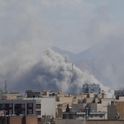There is a chance that Hamas’s shockingly brutal attack on Israel earlier this month will succeed. This is extremely rare where terrorism is concerned; straightforward terrorists never win. The label has long existed as a way both to describe and at the same time condemn attacks by non-state groups whose purpose is not to win a war or gain military advantage, but rather to send a political message of some sort to a wider audience. Invariably the message—whatever it is—fails to get through because of the horrifying means deployed to send it: the bodies of the dead blind us to the story their killers seek to tell.
Terrorists chose random violence of this sort because it is all that they are able to do. Unsuccessful at the ballot box and without military clout, this kind of subversive actor may begin a campaign of violence by carefully killing the “legitimate” target—a police officer or a despised military opponent—but they soon end up killing the innocent. When the “legitimate” targets take the obvious precautions this is all the terrorist has left: it is their weakness that makes them dangerous.
Hamas are not, however, a straightforward terrorist group, senselessly violent though these attacks may have been. They won the most recent election held across Palestine, in 2006, and have been in control of Gaza since 2007. Hamas may be called a terrorist group but if so they are a very governmental sort of terrorist. This authority in Gaza gives them more options than mere violence, and though Israel and its supporters may wish it to be so, their violence does not appear (in the past at least) to have destroyed their wider support in the community. Here they more resemble Hezbollah, Haganah (from Israel’s own “terrorist” past), the South African ANC and the IRA than they do al-Qaeda or the Red Army Faction from 1970s Germany.
So could they succeed? This depends on the group’s strategic intention behind their action. If it was solely to assert, for a brief moment, their capacity—on behalf, they would say, of all the people of Gaza—to resist after years of crushing oppression by Israel, then supporters will claim they have already succeeded. If it was also to establish a higher anti-Israeli intensity than that of the sclerotic Palestinian Authority in the West Bank then they will be satisfied: that is an undoubted effect of the attacks. If it was to foil regional Arab leaders in their efforts to make agreements with Israel which ignore the Palestinians, then Hamas may well have succeeded here too. Arab governments may not be democracies but the Arab Spring has made them cautious about ignoring entirely inflamed local opinion. If added to these goals was a desire to render Israeli life horribly, unnaturally insecure then the group has certainly succeeded at that too, whatever comes next.
But what of Hamas’s declared overarching goal, the destruction of Israel? Might this outcome—unthinkable to the many of us who continue to see a safe Jewish homeland as an imperative after the Second World War—be a possibility? It remains unlikely, but less so than many realise. At work here are two ideas that have long underpinned terrorist action.
First there is what a Brazilian revolutionary from the 1960s, Carlos Marighella, called the strategy of provocation, designed to “force the government to intensify its repression” and so alienate the people further. Usually governments never do fall; all that results is more repression, and this remains the likely outcome in Gaza. But Israel is capable of a brutal response: it has invaded Lebanon twice over what, in comparison with the Hamas invasion, were trivial attacks. The people who might be alienated here are not the (already estranged) Palestinians but—in this age of speedy media—world opinion. The devastation intended to be wrought on Gaza by Israel may lead to a collapse in world support. The likely upsurge in extremist violence in Europe, in the form of Islamist terrorism, may be laid at Israel’s door: the message behind these atrocities might get through.
Second, and even more dangerous for Israel (even if also not likely) is that the old idea of a single event acting as a spark that lights the fires of a wider revolution could conceivably apply here. Killing the Tsar did not transform Russian society the way anarchists believed it would—but what if the Israeli response to the October action drives both the West Bank and (crucially) the Arab citizens of Israel itself into a series of uprisings, or intifadas? With the Gaza operation underway and all those settlers to support in the West Bank, as well as (no doubt) rocket attacks from Hezbollah-controlled territory in Lebanon, would Israel have the capacity to control events? And what if neighbouring states join in, either directly or indirectly? Can Israel fight everyone, all the time?
The idea of terrorism as a global problem is a creature of the 1970s and 1980s, when first Israel and then the US persuaded themselves and the world that Palestinian defensive violence was not an anti-colonial insistence on self-determination but rather part of an upsurge of world violence that threatened our (western) civilisation. To hear the UK’s defence secretary shout on the BBC that Hamas must be called “terrorists” is to realise how much damage this fatuous label has done. The old British empire called its opponents (whether in India, Malaya, Kenya, or Cyprus) terrorists. The description does not end debate even if its users hope that it will. The past victims of colonial aggression in the Global South know this, even if we do not.













